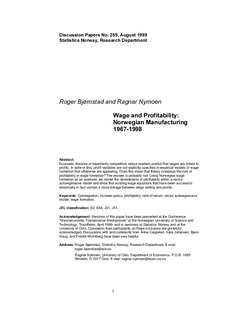| dc.contributor.author | Bjørnstad, Roger | |
| dc.contributor.author | Nymoen, Ragnar | |
| dc.date.accessioned | 2012-02-02T20:06:33Z | |
| dc.date.available | 2012-02-02T20:06:33Z | |
| dc.date.issued | 1999 | |
| dc.identifier.issn | 1892-753x | |
| dc.identifier.uri | http://hdl.handle.net/11250/180861 | |
| dc.description.abstract | Economic theories of imperfectly competitive labour markets predict that wages are linked to profits. In spite of this, profit variables are not explicitly specified in empirical models of wage formation that otherwise are appealing. Does this mean that theory overplays the role of profitability in wage formation? The answer is probably not: Using Norwegian wage formation as an example, we model the dereminants of profitability within a vector autoregressive model and show that existing wage equations that have been successful empirically in fact contain a close linkage between wage setting and profits.
Keywords: Cointegration, incomes policy, profitability, rate-of-return, vector autoregressive model, wage formation. | no_NO |
| dc.language.iso | eng | no_NO |
| dc.publisher | Statistics Norway, Research Department | no_NO |
| dc.relation.ispartofseries | Discussion Papers;No. 259 | |
| dc.subject | Income policy | no_NO |
| dc.subject | vector autoregressive model | no_NO |
| dc.subject | Wages | no_NO |
| dc.subject | Manufacturing | no_NO |
| dc.subject | Norway | no_NO |
| dc.subject | Profitability | no_NO |
| dc.subject | JEL classification: E2 | no_NO |
| dc.subject | JEL classification: E64 | no_NO |
| dc.subject | JEL classification: J31 | no_NO |
| dc.subject | JEL classification: J51 | no_NO |
| dc.title | Wage and profitability: Norwegian manufacturing 1967-1998 | no_NO |
| dc.type | Working paper | no_NO |
| dc.subject.nsi | VDP::Social science: 200::Economics: 210::Economics: 212 | no_NO |
| dc.source.pagenumber | 31 s. | no_NO |
